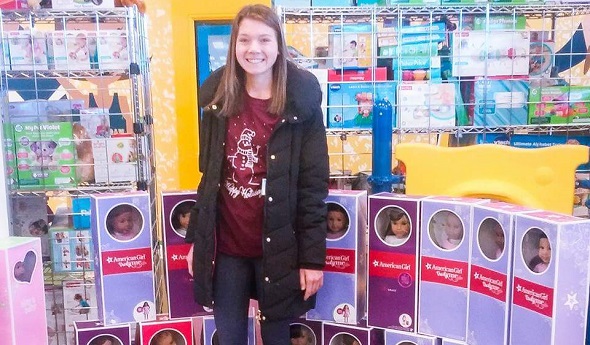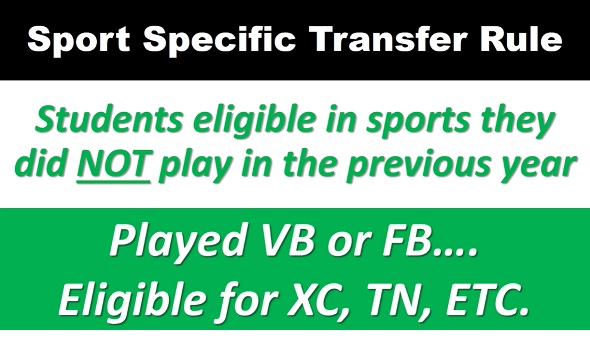
Brighton's Brown Brings Holiday Joy
May 22, 2017
By Geoff Kimmerly
Second Half editor
Bailey Brown will begin at Oakland University this fall with plenty to drive her through what at times will be grueling studies as she prepares for a career in pediatric medicine.
 As the oldest of six siblings, she’s always been around kids – and she loves it that way and looks forward to caring for them as their doctor. But sadly, though just a senior at Brighton, she’s already experienced her share of hospital life – although those tough times also provide motivation and inspired another mission as well.
As the oldest of six siblings, she’s always been around kids – and she loves it that way and looks forward to caring for them as their doctor. But sadly, though just a senior at Brighton, she’s already experienced her share of hospital life – although those tough times also provide motivation and inspired another mission as well.
Brown ran across an advertisement this past winter in an American Girl catalog for dolls without hair – an amazing idea, she thought, because it allows children who have lost their hair during cancer treatment to have a doll that looks just like them.
She decided to raise enough money -- $230 – to buy two dolls for little girls spending Christmas in the hospital. Brown – a recipient of an inaugural MHSAA/Lake Trust Credit Union “Community Service Award” – ended up with more than $5,000 and an opportunity to play Santa Claus to many more thankful families.
“I couldn’t believe how fast things grew. It was hard to keep track of all the donations, but people were just messaging me on Facebook – I couldn’t believe people wanted to do that,” Brown said. “I never thought I’d be able to make such a big difference.”
The Community Service Awards recognize contributions by Michigan’s high school student-athletes away from the field. Brown, a cross country and track runner for the Bulldogs, will use her $1,000 award as a scholarship toward her education at Oakland, where she’ll be part of the Honors College. Six honorees total are receiving awards this spring; Second Half is featuring one a day this week.
 Since seventh grade, Brown has battled what was diagnosed her freshman year as amplified musculoskeletal pain syndrome – an abnormally overactive pain reflex that for Brown caused head-to-toe pain especially in her neck and back, making it difficult to sit and do school work. She also had to stop playing soccer completely and running for a time because of pain in her hips. As a junior, she was diagnosed with bone spurs and torn labrums in both hips, requiring multiple surgeries. As she worked to recover that winter, she had to enter treatment for anorexia after losing 25 percent of her body weight.
Since seventh grade, Brown has battled what was diagnosed her freshman year as amplified musculoskeletal pain syndrome – an abnormally overactive pain reflex that for Brown caused head-to-toe pain especially in her neck and back, making it difficult to sit and do school work. She also had to stop playing soccer completely and running for a time because of pain in her hips. As a junior, she was diagnosed with bone spurs and torn labrums in both hips, requiring multiple surgeries. As she worked to recover that winter, she had to enter treatment for anorexia after losing 25 percent of her body weight.
Despite those challenges, she managed to build a 3.88 grade-point average to rank among the top 15 percent in her graduating class. She also came back to continue running cross country and returned to the track this spring for the first time since eighth grade, while also participating in National Honor Society and her school’s Interact club.
As a doctor, Brown hopes to help children and teenagers who might be going through the same. Her service over the winter was aimed especially at children who would have to remain in the hospital over the holidays.
The outpouring of donations allowed her to affect many more families than she would’ve at first imagined – she was able to purchase 48 dolls plus hundreds of toys for little boys also undergoing cancer treatment. She delivered the dolls and toys to University of Michigan’s C.S. Mott Children’s Hospital, where she volunteered in the annual Mott Toy Shop that allows parents to pick up gifts for their children free of charge – saving money and time shopping “to make Christmas much easier and children a lot happier.”
Brown surely will be busy jumping into her first year of college, and she still fights pain although running and deep tissue massage alleviate some of it. But she said she’d like to start another campaign for hospitalized kids like the one that came off so successfully this past winter, maybe something even larger in scope.
“I am proud of everything I have accomplished despite my setbacks,” Brown wrote in her award application, “and look forward to touching even more lives this year.
“I have learned never give up, no matter how many obstacles are thrown my way.”
The Community Service Awards are sponsored by the Michigan High School Athletic Association and Lake Trust Credit Union to recognize student-athletes' efforts to improve the lives of others in their communities. In addition to the $1,000 award, the Lake Trust Foundation is awarding an additional $500 to each honoree, to be donated to a non-profit, 501 (c)(3) organization of the awardee’s choice.
PHOTO: (Top) Brighton’s Bailey Brown stands with some of her donation of toys to the C.S. Mott Children’s Hospital this past winter. (Middle) Brown is recognized by Mott on its Instagram feed. (Photos courtesy of Bailey Brown.)
2017 Community Service Awards
Sunday: Colon "Yard Squad" - Read

Brush Up on the New Transfer Rule
July 18, 2019
By Rob Kaminski
MHSAA benchmarks editor
Eligibility under the new “sport-specific” transfer rule begins this coming fall after circulating extensively for nearly one school year.
Unless one of the stated 15 exceptions is met, participation during the 2018-19 school year determines eligibility for 2019-20.
The new rule adopted by the Representative Council at its May 2018 meeting has found support among most audiences. A transfer student’s eligibility in 2019-20 is based upon that student’s participation from this past school year (2018-19). It will be paramount for administrators and coaches to have awareness of the sports a transfer student participated in during the previous school year.
The long-standing 15 Exceptions to immediate eligibility, such as a full and complete residential change or a student moving between divorced parents by completing of an Educational Transfer Form, did not change.
One might call the rule on the way out “The Fourth-Friday Transfer Rule.” Under this old rule, when a student enrolled at the new school determined his or her eligibility. Under the new Sport Specific Transfer rule, what a student played in the previous season determines eligibility.
The Council passed a more lenient rule on the one hand and more restrictive on the other. The more lenient aspect is a change that finds a transfer student ELIGIBLE in any sport in which he or she did not participate in a game or a scrimmage in the previous school year.
The more restrictive portion tends to discourage students who change schools for sports reasons. A transfer student who did play a sport in the previous season – and who does not meet one of the 15 Exceptions – is NOT ELIGIBLE in that sport for the next season. If a student changes schools in mid-season, the student would be ineligible for the rest of that season in that sport and the next season for that sport.
Participation under this and other rules means playing in an interscholastic game or scrimmage after starting the 9th grade at any high school. It does not mean practice, but entering an interscholastic game, meet or scrimmage in any way. It also may involve more than one sport, so a three-sport athlete who does not have a residential change and transfers would be ineligible in those sports during the next school year – but eligible for any other sport. It also means a student cut from a team – one who never entered a scrimmage or game – may transfer and play without delay for that new school’s team. It may also mean that a student who meets one of the stated exceptions such as a residential change but enrolls in a school other than her or his school of residence, would have eligibility in sports not played in the previous year.
The new rule will tend to discourage students from changing schools for sports because they would be ineligible in any sport they have played in school the previous season for that sport. It will increase participation for some students who were otherwise not eligible under the current rule.
It is always best to contact school athletic directors who can connect with the MHSAA to verify eligibility prior to enrollment.
If the student’s new school requests in writing, the MHSAA Executive Committee may approve a waiver that reduces the period of ineligibility to 90 scheduled school days at the new school if the change of schools was for compelling reasons demonstrated with outside documentation having nothing to do with sports, curriculum, finances, and school demographics. The Executives Committee also has authority to approve immediate eligibility.

